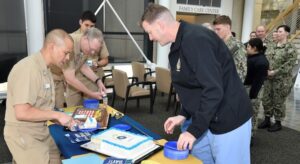
Story by Douglas Stutz
Naval Hospital Bremerton/Navy Medicine Readiness and Training Command Bremerton
The Navy physicians and surgeons assigned to Naval Hospital Bremerton took a brief respite to recognize their Navy Medical Corps 153rd birthday, March 4, 2024.
“We’re more than 4,200 members strong and there is no place in which we do not serve, from our clinics and hospitals to austere operational environments around the globe. We are proud to serve alongside warfighters on land and at sea. Today, we take a moment to celebrate our heritage, our history and our accomplishments. A very happy birthday to our Navy Medical Corps,” said Capt. Samuel Espiritu, chief medical officer, one of approximately 35 Medical Corps officers assigned to NHB and master of ceremonies for the celebratory event.
Espiritu read birthday greetings from other Navy corps chiefs from Dental Corps, Hospital Corps, Medical Service Corps, Nurse Corps and Civilian Corps.
Well-wishes from Rear Adm. Guido F. Valdes, Naval Medical Forces Pacific commander and Medical Corps director were shared on behalf by Capt. Harlan Dorey, NHB branch clinic director, “I’d like to thank each of you for your hard work and steadfast commitment to the health and readiness of our nation’s fighting force and Navy Medicine’s mission. Though we officially commemorate the birth of our corps on March 3, 1871, our legacy extends well beyond that date. From the Continental Navy to recent conflicts in Iraq and Afghanistan, we have kept our warfighters in the fight and saved countless lives. From 153 positions at our founding 153 years ago, today we stand more than 4,200 strong active duty and reserve and represent more than 23 specialties. The work you do, whether saving lives on the battlefield, providing care in our hospitals and clinics, or conducting medical research, is vital to our warfighters, our Navy and our nation.”
Capt. Mark Lund, NHB executive officer delivered remarks from Rear Adm. Darin K. Via, Navy Surgeon General and Bureau of Medicine and Surgery chief, who wrote in part, “On behalf of Navy Medicine and a grateful nation, I extend my heartfelt thanks and appreciation to the men and women of the Navy Medical Corps as you celebrate 153 years of excellence. Since March 3, 1871, when the Medical Corps was formalized, physicians have led the charge for Navy Medicine when ensuring the operational readiness for our Sailors and Marines.”
Coincidentally, in March 1903 – just 32 years after Medical Corps officers began to pave the way in patient care delivery and lifesaving healthcare from ship to shore – Navy Medicine’s presence in Puget Sound was officially designated as a naval hospital on the site of what is now Puget Sound Naval Shipyard Dry Dock Number One.
The official military treatment facility was a two-story 16 bed facility. Back then, as now, the military treatment facility was predicated on Medical Corps’ capability to care for Sailors, Marines and their families with expertise, quality and compassion.
A Brief History
On March 3, 1871, the 41st Congress enacted the Appropriations Act which established the Medical Corps as a separate entity and as a staff corps of the Navy. However, the term “Medical Corps” and the existence of Navy physicians, long pre-date this Congressional Act. Early in 1798, the first physicians were awarded commissions in the Navy as surgeons and surgeon’s mates.
Their mission was direct: provide medical care aboard ships and shore stations.
Navy physicians served at Marine (later Public Health) hospitals and other makeshift facilities spread throughout the eastern seaboard.
A bill establishing permanent Navy hospitals was signed into law on Feb. 26, 1811. Some twenty years later, the first of these hospitals went into commission at Portsmouth, Va. On Aug. 31, 1842, the Bureau of Medicine and Surgery was created to oversee administration of hospitals and medical supplies. And 1871, the title of “Surgeon General of the Navy” was created for the chief of BUMED.
The Medical Corps’ scope has grown in complexity since 1871. Navy physicians now serve with the Marine Corps, in the Attending Physician’s Office to Congress and the White House. They also serve in the aviation and undersea medical communities, and as astronauts exploring the frontiers of space. Navy Medical Corps continues to pave new frontiers in biomedical research, medical education and training, and patient care delivery at Defense Health Agency clinics, hospitals, aboard afloat platforms, joint commands and in combat theaters.
Primary Responsibility of Medical Corps Officer
The Navy Medical Corps is currently comprised of approximately 4,200 active duty and Navy reserve physicians who are practicing or training in dozens of medical and surgical specialties.
Areas of Specialties include Family Medicine, Internal Medicine, Pediatrics, General Surgery, Orthopedics, Otolaryngology, Ophthalmology, Emergency Medicine, Radiology, Psychiatry, Obstetrics/Gynecology, Preventive Medicine, Occupational Medicine, Aerospace Medicine, Undersea Medicine, Plastic & Reconstructive Surgery, Neurosurgery, Neurology, Anesthesiology, Urology, Pathology, Physical and Rehabilitative Medicine, Dermatology.
Duty Stations
Navy physicians are stationed at medical treatment facilities, medical education institutions, clinics, and hospitals located within the United States and various overseas locations, research units, and in various joint commands.
Navy physicians are assigned as operational medical officers providing direct support to Navy and Marine Corps commands, squadrons, battalions and units. Navy physicians deploy in support of combat operations, disaster relief and humanitarian assistance missions, as well as provide patient care ashore and afloat.